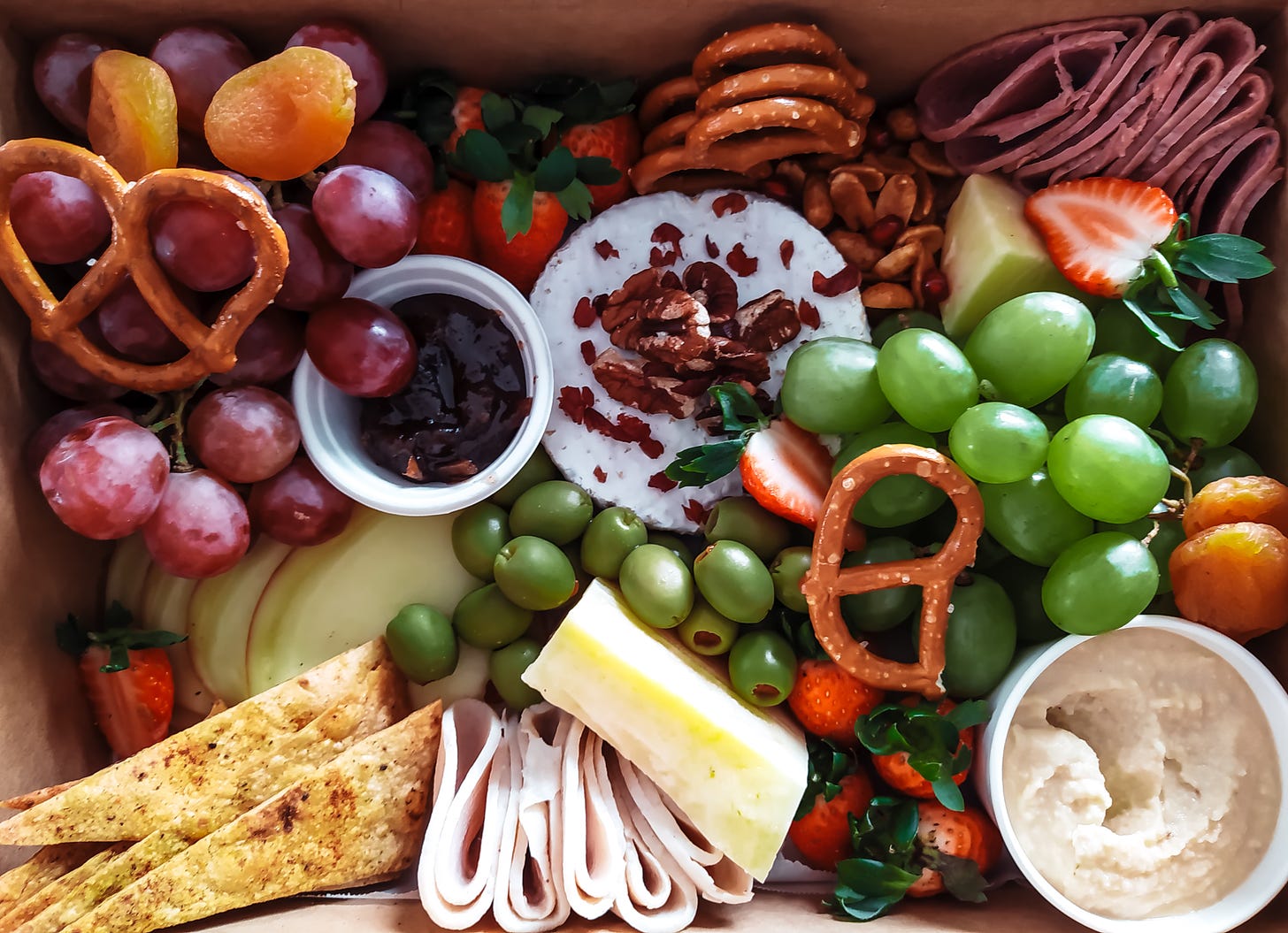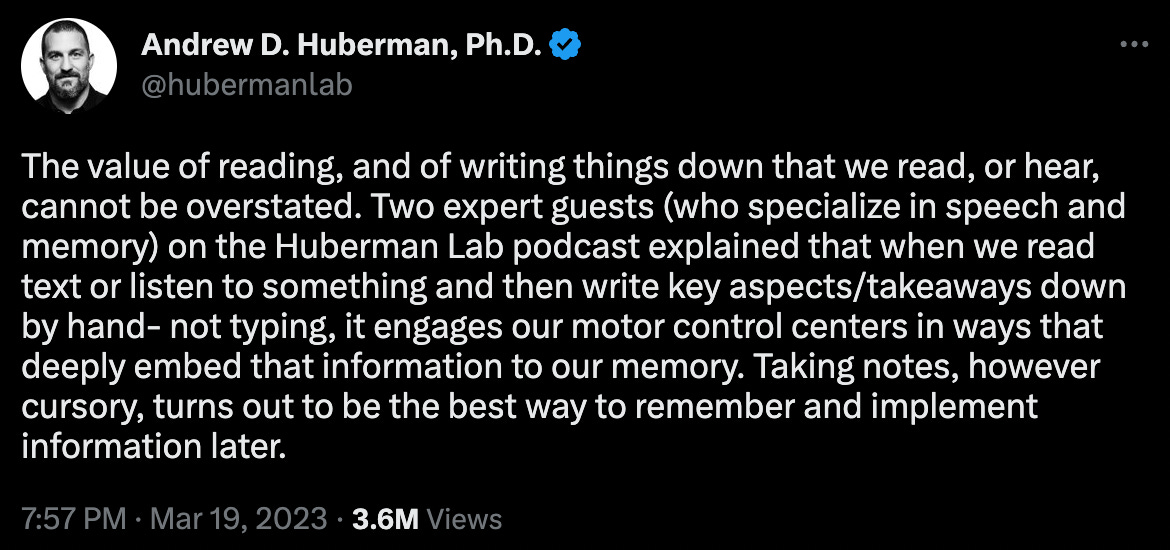International Generalist #7: Only 10s, exercise snacks, university regrets and protein.
Your bi-weekly dose of actionable insights to make you just a tiny bit more effective.

Welcome to the 7th edition of International Generalist. Today, we’ll look at purpose in life, financial advice for students, one way to retain information better, one way to get fitter, and protein.
If you don’t find this valuable, you can always unsubscribe at the bottom of this email. If you like it, tell your friends to subscribe here. It’s the best way to support this newsletter. :)
Let’s dive in.
[1] An eBook to help you find your purpose in life
I re-read an old notebook today, packed with notes from my trip to the Dominican Republic in 2017. Aside of smart quotes like “fires only burn when they have room to breathe” and things I still need to eat during my time in the Caribbean (among them, Mangù, which tastes fantastic), I found something very interesting:
My notes from working through the book “Only 10s” by Mark Silverman.
The main thesis of the book is: do what truly matters to you, and cut all the other distraction. While I’m still not wildly successful at doing that, the results from reading the book have been transformative for me.
And they were all in the notes: goals, distractions, things I wanted to do and achieve.
6 years later, I realized I had achieved almost all of the things I had written down. Build a successful startup? Check. Write regularly? Check (you’re reading it right now). Make the Lacrosse national team? Check.
(the list goes on and on …).
Having done that, I think it’s time to read it again. To identify new goals I want to take on, but even better, find new distractions to eliminate.
The book was so good that I read it start to finish on the airplane. And worked through it on the same flight.
I set out to the Dominican Republic to figure out my purpose for the next years.
In the last sentence of my notes, it says:
“That’s it. The whole purpose of the trip is already taken care of within the first few hours of it.
Holy shit.”
These were some of the most inspirational hours of my life.
Go check out the book. Maybe it’ll do the same for you.
[2] Financial Advice I would’ve needed as a student & entrepreneur
Money doesn’t always have the same value. In fact, money provides highly diminishing returns, so choose wisely on how you use it.
Here’s a regret I have about my early 20s:
I read that the earlier you start investing, the better. Compounding interest and all. So I did. As a student and then bootstrapping founder, I didn’t have a lot of money, so my investments were usually in the range of 50-100 € per month.
Looking back, this was a mistake.
Working with a much higher salary now than when I was a student (no surprises here), I can easily invest much more than I was able to during my studies. And I quite frankly don’t really give a shit about having or not having 50 € anymore.
On the other hand, these 50-100 € would’ve meant a lot for me back then. I rarely went out to bars or restaurants. Didn’t buy things that I really could’ve used well. Always took the uncomfortable way, and said no to a lot of things, simply because I wouldn’t want to afford them.
And I probably could’ve afforded some really cool things with these 600-1.200 € per year that I put into my investments.
Back then, I really did give a shit whether I had 50€ or didn’t.
So, my advice to students out there is: if you are on a trajectory to make a lot of money after you finish studying - don’t bother with investing unless you are saving for something really specific (e.g. a car, real estate, world travel etc).
If, for some reason, you’re expecting hardship after graduation, then it might make sense to save/invest money instead, and you should always have a cash cushion for unexpected expenses (3 months of living costs is solid in my opinion).
But if you can, use the money instead to get the most out of a time in your life where you have both free time and lots of energy. This won’t always be the case.
You can always make more money, but you cannot make more time or energy.
So ignore the common advice and go have some fun.
[3] Handwriting = Knowledge Retention
Insight from - again - Dr. Andrew Huberman.
Taking notes by hand is the best way to retain knowledge.
Which makes sense: very few people can take notes by hand word for word in real times. There’s a reason shorthand exists after all.
Hence, when taking handwritten notes, our brain already has to process, digest and compress the information expressed. Undoubtedly, this is good for retention - regardless whether these notes are from a lecture, a podcast or a book.
I still write by hand every day. Retention is just one good reason for it.
Next week, I’ll publish a long-form post about 9 more good reasons to write by hand.
[4] Exercise Snacks
Insight from Dr. Andy Galpin.
“If you’re working nine to five, you would normally take coffee breaks and washroom breaks. If you’re going to take a break and have a little snack, have a snack of activity too.”
What’s an exercise snack?
Simple: every four hours, you sprint for 20 seconds as hard as you can. Like, running up stairs for 20 secs.
A study done by Canadian researchers revealed that this intervention (three times a week, for six weeks) led to significantly increased VO2MAX, a measure for maximum Oxygen intake that predicts cardiovascular endurance.
It also helps regulate glucose levels after a high glycemic index meal. So next time you have a burger and fries for lunch, try running up the stairs for 20 seconds. Just don’t throw up.
In one minute per day, you can make a significant difference on your cardiovascular health.
Might be worth a shot, right?
[5] Protein = Lego bricks for your body
Insight from Chiara.
When training, your muscle breaks down in micro-tears.
Hold on, that sounded weird. Let me rephrase: when training, you create micro-tears in your muscle that are then rebuilt. Bigger. And stronger.
However, your body can only go into rebuilding mode if you give him enough bricks. The best Lego manual is meaningless if you don’t have the right bricks.
Protein = Lego bricks for your body.
How much protein are you eating? Just like with Vitamin D, probably not enough. This was the conclusion of a few friends in my close circle, who all started eating meat and protein shakes again and felt much better.
Here’s a rule of thumb for you: eat at least 1g of protein per kg of bodyweight per day (assuming you have 20% or less body fat; if you have more, the equation changes). If you’re looking to bulk up, bump that number to 1,5g per kg of bodyweight (for me, this means ~130g of protein per day).
Getting to this number is actually not that easy, particularly if following a vegan diet (yes, I know, legumes contain protein too but try eating 130g of protein in form of lentils).
Check your protein intake. Then, adjust accordingly.
—
Action item recap:
Get the Only 10s book and do the exercises thoroughly.
Understand how much money means to you right now vs. in the future, and spend accordingly.
Take notes by hand instead of on your computer (+ subscribe for my post next week).
When getting a snack, also get an exercise snack.
Check your protein intake. You’re probably not getting enough of it.
—
That’s it for this edition of International Generalist. Thanks for tuning in and reading!
If you enjoyed this, please ask yourself: which one person that you know would most benefit from reading this newsletter? The number one way to support me is to share this with others aspiring to become more effective in their personal and professional lives.
Who’s behind International Generalist?
I’m Dominik, and every day, I try to figure out how to become a tiny bit more effective. Then, I share some of the lessons learned here.
When I’m not writing, I build the international business for Sdui - the Leading European SchoolOS -, play Lacrosse, lift weights and enjoy draft beers.
Here’s how else I can help you:
Book a 1:1 meeting to discuss the international expansion strategy of your startup
Read the newsletter archive for more actionable nuggets
Send me a question, so I can answer it in the newsletter or in a long-form blog post
See you in two weeks!
Much love
Dominik




